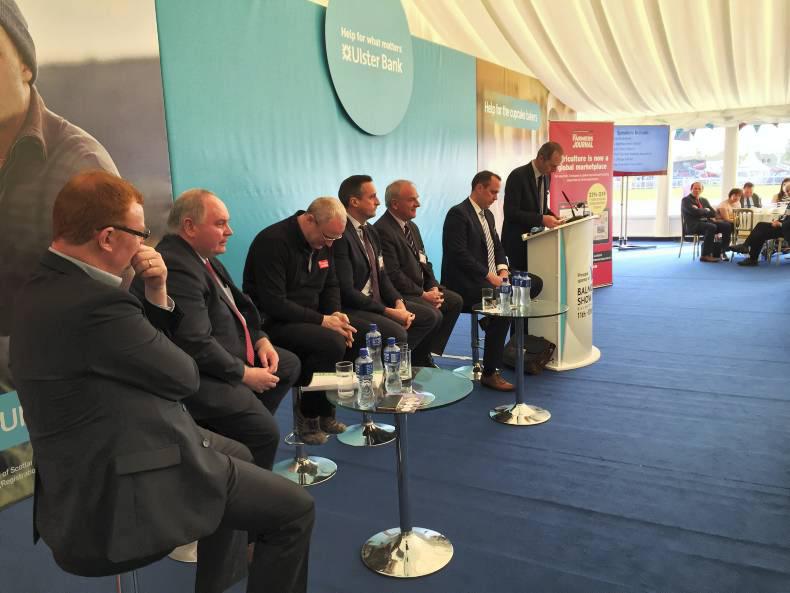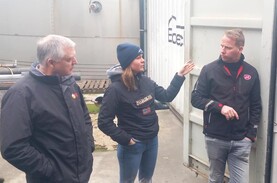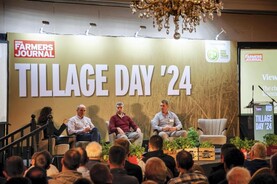Thomas Hubert Digital editor thubert@farmersjournal.ie
It may feel that the latest CAP reform only just finished with the rollercoaster of new schemes and milk quota abolition implemented in the past year, but Irish Farmers Journal editor Justin McCarthy told a full room of farming and food industry representatives at the Balmoral Show this Friday morning that their attention should now turn to the next one.
“We have a totally dysfunctional CAP that is not fit for a global market,” McCarthy said, illustrating his point with the European Union’s inability to deal with current price volatility. “Expecting farmers to produce in a regulated market for an unregulated global market is not sustainable.”
Low commodity prices
While low commodity prices affect all farmers, he highlighted that cheap grain and energy were particularly detrimental to grass-based production in regions like Ireland, eroding its competitive advantage. Political interference, such as the Russian ban on European food imports, only makes matters worse.
Justin McCarthy exposes external factors affecting farming: low grain prices make grass-based less competitive, and: pic.twitter.com/1gzMrUfDOF
— Farmers Journal NI (@FJNorth) May 13, 2016
Yet no tools seem to be available to address those imbalances. Irish Farmers Journal specialists addressing the briefing shared some thought-provoking ideas to explore ways to find a new equilibrium for family farms faced with the challenges of a global market, in Northern Ireland and beyond.
We are headed for 400,000t of milk powder in intervention by mid-summer. Should we take it out and replace soya in pig feed?
As pig farmers are struggling to make a profit, “we are headed for 400,000t of milk powder in intervention by mid-summer. Should we take it out and replace soya in pig feed?” McCarthy asked.
Agri-business editor Eoin Lowry warned against excessive reliance on Chinese demand. “The company reports I’ve read in the past few years were all about growth in China, but this is now gone,” he said.
Instead, he suggested we look at old markets offering new possibilities, such as Iran – a traditional beef importer now hungry for dairy products.
Agribiz editor @eoinlowry says we need to look beyond China for growth, e.g. Iran for dairy pic.twitter.com/z84gsMg3p7
— Farmers Journal NI (@FJNorth) May 13, 2016
“We should also look west,” Lowry added, saying the US presented a huge opportunity. “This is a wealthy market that likes what we produce, and we want to be in a premium rather than commodity market.”
Production drive worsening market imbalance
Tillage editor Andy Doyle highlighted that farmers globally held the key to the current oversupply in a number of agricultural markets. “When margins reduce, the reaction is to expand” to make up for the lost income, he said. But this natural reaction to “drive on” does not help with market imbalance, he added.
Any discussion of European policy in Northern Ireland with less than six weeks before the UK’s Brexit referendum inevitably includes a mention of the subject, and Friday’s breakfast briefing was no exception.
Markets specialist Phelim O’Neill said that Brexit was most threatening to the Republic of Ireland, which depends on England alone for 54% of its beef exports. For UK voters, including Northern Ireland farmers, he said the choice was more in terms of how one considers risk. “There is nothing emotionally attractive about the EU, apart from the Ryder Cup,” he said, but it offers the safety of status quo. Meanwhile, Brexit is the logical choice “if you are a believer in gambling and speculation”.
There are no facts about Brexit because no country has ever done it before
Livestock specialist Kieran Mailey added that “there are no facts about Brexit because no country has ever done it before”.
Jim Nicholson MEP cautioned against an exit vote from a food exports perspective, saying: “If anyone thinks the UK can exit the EU and get new trade deals in 12 months, they should get a new life. And the UK alone will never do trade deals that are favourable to agriculture.”
If the UK does decide to stay in the EU, McCarthy urged the Northern Ireland agri-food industry to “engage on the next CAP reform now”, adding that several member states were prepared to turn things around.
He argued that farm supports should be seen neither as social payments nor solely margin insurance schemes aligned on the US model, but revert to its original core mission: “We should have policy and payments aligned to support productive farmers, and environmental and economic sustainability should go hand in hand,” McCarthy said.






 This is a subscriber-only article
This is a subscriber-only article










SHARING OPTIONS: